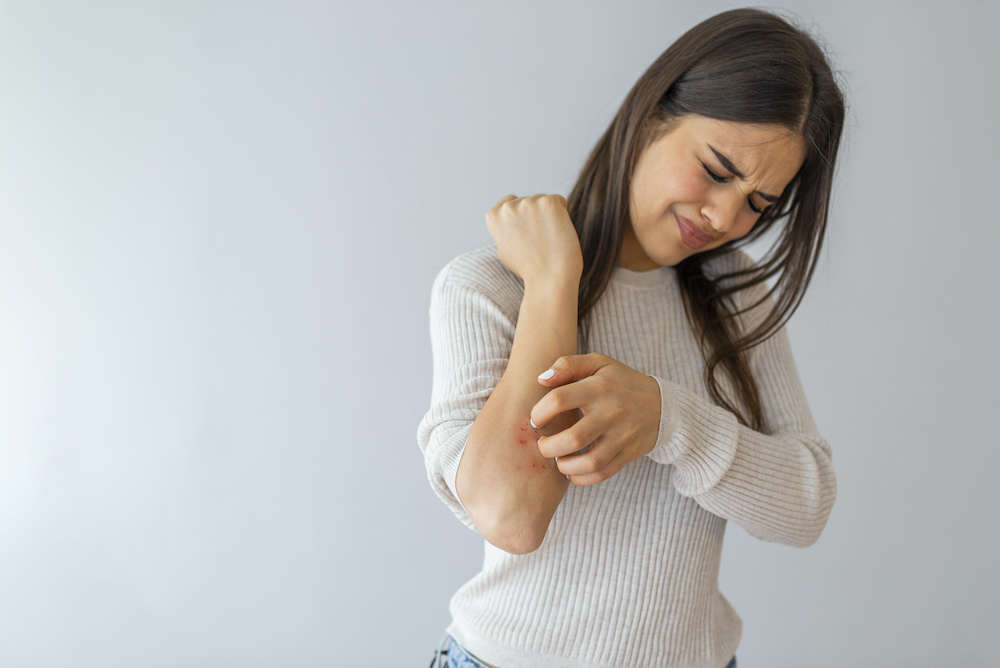What is Eczema and How to Treat it

What is Eczema?
If you’re experiencing an intense, dry skin every so often, you may have a case of eczema that comes and goes from time to time. It’s a common skin condition, many times known as atopic dermatitis, that comes with dry, scaly skin and redness. It is a non-contagious inflammatory skin condition that can be very common in children, but adults can get it too.
While there are different types of eczema and a variety of effective treatments, visit Buckhead Dermatology in Atlanta and College Park to discuss specific dermatology solutions. Together we can come up with the right treatment plan for your skin.
What are the different forms of eczema?
While eczema is most commonly known under its singular name, there are a variety of types. The most common is atopic dermatitis, where a rash forms in the creases of the elbows and knees. The skin in areas where the rash appears may be lighter or darker, and it may also be thicker. Small bumps may also be present which may leak clear fluid when scratched, making it susceptible to infection.
Contact dermatitis is caused by a negative reaction to substances you touch, resulting in red and irritated skin. This can be from an allergic reaction to a substance that irritates the skin like latex, metal or a chemical irritant.
Dyshidrotic eczema causes small, fluid-filled blisters to form on fingers, toes, palms, and the soles of your feet that itch and can be quite painful.
Another type of eczema called hand eczema develops strictly on the hands. This type can be developed by those who regularly use chemicals that irritate the skin. Those affected have red, itchy and dry skin that may form cracks or blisters.
Neurodermatitis causes thick and scaly patches to form in different areas on the arms, legs, feet, scalp or other areas. Patches may bleed or become infected when scratched.
Nummular eczema is less common and causes coin-shaped spots to develop on the skin that may be itchy or scaly. This could be triggered by a reaction to an insect bite or an allergic reaction.
Fluid leaking out of weakened veins into your skin causes stasis dermatitis, which may result in swelling, redness, itching and pain.
How to treat your eczema?
The best way to keep your skin healthy while dealing with eczema is to treat the symptoms and understand what triggers your eczema. Prevention is a great place to begin. Look to food allergens, detergents and other skin irritants that may be causing flare-ups. Keeping your skin moist is also important, using either a moisturizing cream or a prescribed ointment. These should be applied several times a day, including after hand washing and after showers while the skin is still damp. To avoid irritation, you should also try to avoid products with perfumes, dyes or alcohols as much as possible.
Fortunately there are also plenty of at-home remedies that can help treat cases of eczema. For example, taking warm baths using colloidal oatmeal — a finely ground oatmeal that is made for the bathtub — can help to moisturize the skin and relieve skin irritation, redness and inflammation. Soak in the bath for approximately 10 to 15 minutes and then pat dry after the bath. You’ll want to leave a thin layer of the oatmeal bath on your skin, so avoid rubbing it off with a towel, which can also irritate the skin.
Using a humidifier at home can help skin from becoming too dry. There are several natural topicals that can be used as well. Aloe vera, which you may know as a treatment for sunburns, can also be effective for soothing eczema. Its antibacterial and antimicrobial properties are valuable in case there are any breaks in the skin that may cause concern for infection. However, it’s best to buy aloe leaves to source your aloe as many commercial products may contain alcohol.
Coconut oil can also help keep eczema moisturized to alleviate itching, dryness and cracking. Honey can help treat eczema as well, since the natural bee-derived substance has anti-inflammatory properties.
Atopic dermatitis can also be linked to stress and anxiety, so if other external treatments are not effective, look inward and see where stress can be reduced in your daily life. It can also be linked to gut health, so dietary changes may want to be explored. Eczema is an inflammatory condition, and since certain foods can cause or reduce inflammation in the body, making a few key dietary changes could help. Anti-inflammatory food options include fish, leafy greens, beans and lentils, colorful fruits and vegetables, turmeric and cinnamon, just to name a few.
When already suffering from a flare-up and medication is needed, over-the-counter creams and ointments containing cortisone can help contain the itching, swelling and redness. But, a stronger prescription may be needed.
If you feel that your eczema needs professional assistance, contact the board-certified dermatologist at Buckhead Dermatology. Dr. Straughn has over 25 years of experience in assisting patients suffering with eczema. Visit her at her Atlanta and College Park offices for a tailored treatment plan based on your skin needs.
